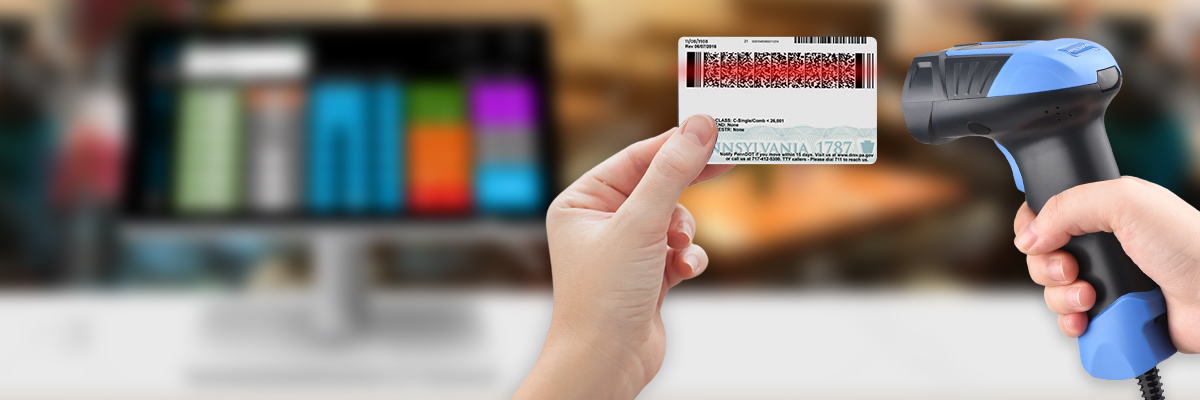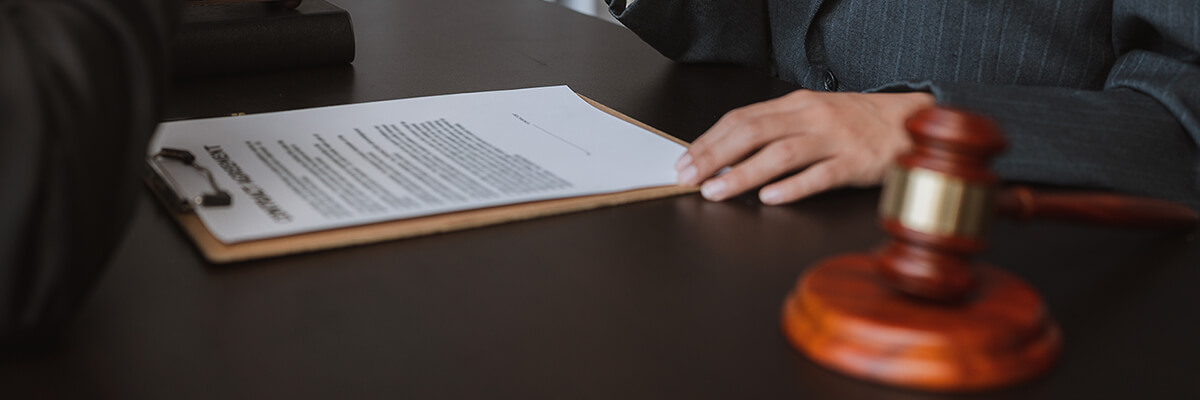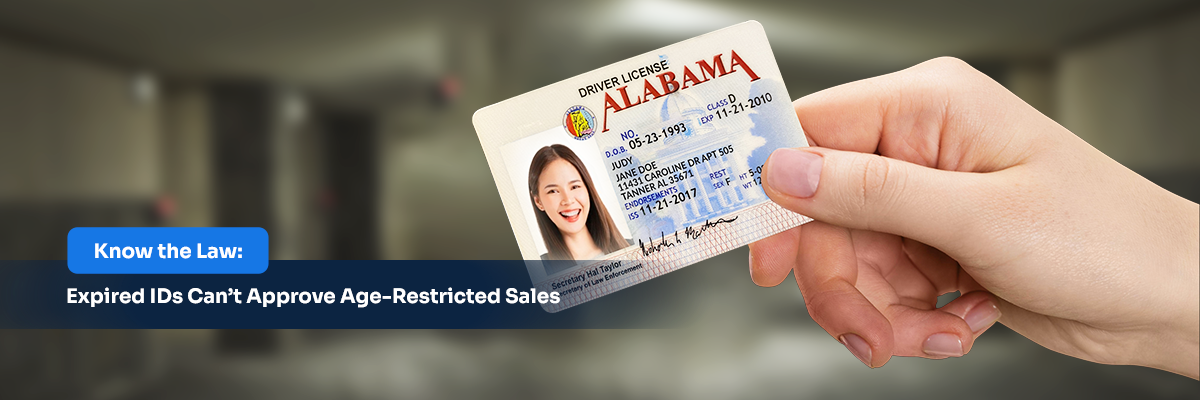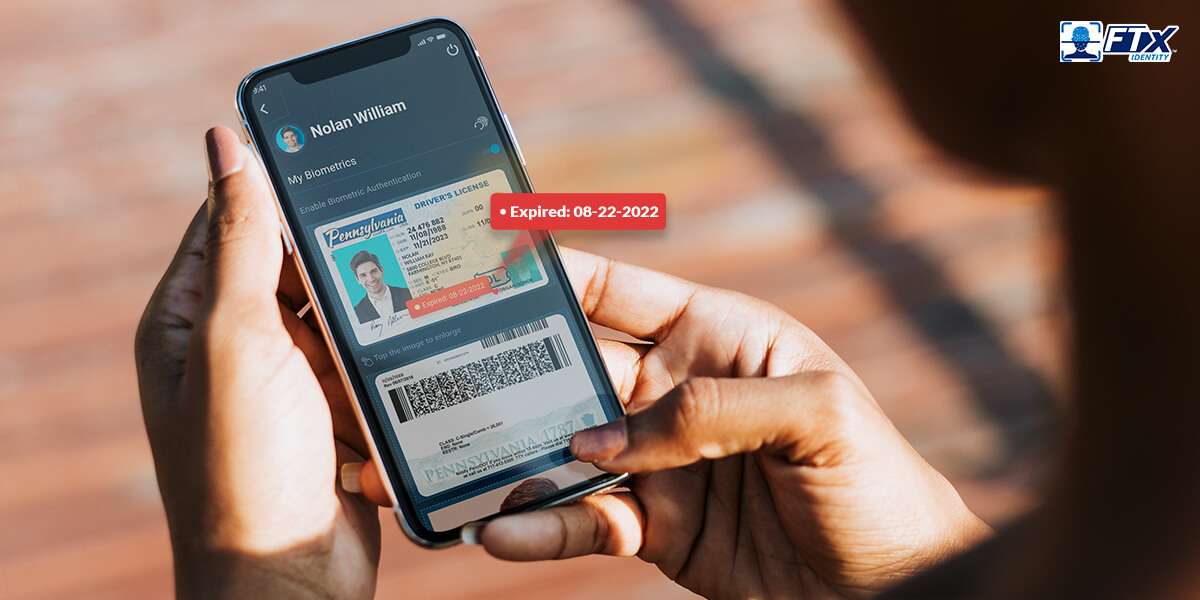Heads up, bar owners and businesses selling age-restricted products!
You know the importance of checking customer IDs, but do you know how to handle an ID that’s expired? Will an expired ID scan? And if so, how long can you use an expired id?
Here’s the short answer: Expired IDs scan. However, ID scanners will typically inform a cashier that the ID is expired. Depending on the state, you may or may not be able to use an expired ID to buy alcohol, enter a bar, or shop at a dispensary.
From January 1, 2023, the Nevada government has issued AB360 that makes using ID scanning software for age-restricted products. Get in touch to learn more about how this law is impacting businesses and explore online ID verification solutions.
Now, you may be wondering: Which states have laws against expired IDs? And is an expired ID a valid form of identification? This guide covers those questions and touches on the legal requirements of expired IDs for bar and retail shop owners.
How Do ID Scanners Catch Expired IDs?

ID scanners may be able to catch fake IDs and invalid driver’s licenses (although many fake IDs still scan). Typically, scanners capture vital information from ID cards like:
- Date of birth
- Expiration date
- Address
- Name
- Physical details
Some of this data is generally available when scanning an ID barcode. If an ID is deemed fraudulent or invalid (e.g., fake or expired), the scanning technology will alert the operator. For example, after scanning an expired ID, the scanning tool might say: “This ID expired on [expiration date].”
In other words, ID scanners are very useful in bars, dispensaries, and retail locations that sell age-restricted products (especially if it’s against state law to accept an expired ID).
Avoiding Human Error
The expiration date on driver’s licenses is typically passed over during manual ID checks. This is especially true in venues that serve high volumes of customers.
Unfortunately, bars and retail venues may have a legal obligation to deny expired IDs. This is typically dependent on state law.
ID Expiration Laws: What to Know

Every state has its own laws regarding the use of expired IDs. Here’s a sample of some state laws regarding expired IDs:
- Texas – You can use an expired ID at a bar in Texas or to purchase alcohol, according to the Texas Alcoholic Beverage Commission.
- New York – New York law prohibits the purchase of alcohol with an expired ID.
- California – California says an expired ID is not a valid form of identification.
- Washington – Washington state requires IDs to be valid (not expired) to purchase alcohol or shop at a dispensary.
- For Flying – The TSA will accept an expired ID up to one year after the expiration date.
- Grubhub – Grubhub says drivers should not accept an expired ID.
In Texas, rules may be set by the business owner. Therefore, a certain bar or restaurant may accept an expired ID, while other venues in Texas will deny them.
Ultimately, you should be aware of the laws in your state. Check your state’s alcohol control board website for more information, or contact a local legal professional for a definitive answer.

Risks of Accepting Expired IDs
Many retailers wonder: “Do expired IDs scan?” or “Will an expired ID scan at a bar?” The technical answer might surprise you – yes, expired IDs still scan in many cases. The magnetic stripe or barcode often remains readable. But here’s the critical problem: scanning doesn’t mean it’s valid.
Accepting an expired ID might seem like a harmless way to avoid customer conflict, but it opens your business to serious legal, financial, and security risks. Whether someone asks, “Can you get into a bar with an expired ID?” or tries using one at your retail store, the consequences for your business remain the same.
1. Legal Penalties
The moment you accept that expired ID at a bar or retail establishment, you’re assuming massive liability.
1.1) Fines for Selling to Minors: Regulators don’t care if the ID is scanned properly. An expired license is invalid, and selling age-restricted products with one can trigger massive fines.
1.2) Compliance Risks: You automatically fail compliance checks from alcohol, tobacco, and lottery control boards.
1.3) Licensing Violations: Your business license to sell regulated products is put in immediate jeopardy.
1.4) Business Closure Risks in Regulated Industries: Repeated violations can lead to temporary or permanent suspension of your operating license.
1.5) Damage to Brand: Being fined for compliance violations creates negative publicity that erodes customer trust.
2. Fraud Risks

Will an ID scan if it’s expired? Often, yes – and that’s exactly what fraudsters count on.
2.1) Fraudsters Using Old IDs: Criminals use their own genuinely issued but expired IDs, knowing some businesses will still accept them.
2.2) Identity Theft: Expired IDs often end up for sale on the dark web, where they’re used to build convincing fake identities.
2.3) Fake IDs Created Using Expired Templates: Counterfeiters use expired IDs as templates to create more convincing fakes.
2.4) Chargeback: If you accept an expired ID for age-restricted sales and it turns out to be fraudulent, you face unrecoverable losses and potential penalty fees.
3. Operational Issues
Even if you avoid legal trouble, accepting expired IDs creates daily operational headaches.
3.1) Store Policy Conflicts: It creates confusion about when to enforce rules and when to make “exceptions.”
3.2) Employees Making Inconsistent Decisions: Without a clear “NO EXPIRED IDs” rule, staff must make judgment calls, leading to unfair treatment of customers.
3.3) System Logs Showing Non-Compliance: Your “Will an expired license scan?” question becomes irrelevant when audit trails show you accepted invalid documents.
3.4) Time-Consuming Checkout: When customers ask why their expired ID scans can’t be approved, it creates delays and adds unnecessary friction at the register.
3.5) Negative Customer Experience: The argument that ensues when you reject an expired ID creates a negative experience that can drive customers away for good.
For more tips, see our guide to driver’s license verification, which provides tips and strategies business owners can use to prevent invalid IDs from being used on premises.
Accepting an Expired ID: Legal and Practical Scenarios
We’ve established why accepting expired IDs is risky, but what about those gray areas? When customers ask, “Will an expired license scan?” or “Can you get into a bar with an expired ID?” they’re often thinking about special circumstances.
While the general rule remains “no expired IDs,” there are specific scenarios where the lines can blur – but understanding these exceptions is crucial for maintaining compliance.
1) Military ID Exceptions
Active-duty military personnel may have extended validity on their IDs during deployment or transition periods. However, this isn’t universal – the extension must be officially documented. For retailers, the question “Do expired IDs scan?” becomes secondary to verifying the official military documentation that validates the otherwise expired credential.

2) State-Specific ID Laws
Some states offer grace periods for recently expired driver’s licenses, particularly for renewal transactions at the Department of Motor Vehicles (DMVs). However, this grace period typically doesn’t apply to age-restricted purchases. Whether an expired ID still scans or not, your business must follow the stricter standard for alcohol, tobacco, and lottery sales.
3) Law Enforcement Discretion
While police may show flexibility if an ID is expired during a traffic stop, that discretion doesn’t apply in retail settings. Your legal obligation to verify valid identification for regulated sales remains the same. What’s acceptable in one context could still put your business at risk of serious penalties.
4) Emergency Situations
In genuine emergencies – like purchasing emergency supplies during a crisis – some businesses might make exceptions. However, this shouldn’t extend to age-restricted products. The real question isn’t whether an expired ID will scan – it’s whether accepting it could put your business license at risk in an already tricky situation.
Myths About Expired IDs
When it comes to ID verification, misinformation can cost your business dearly. Many common beliefs about expired IDs are simply wrong – and acting on them puts your compliance at risk. Let’s clear up the confusion and tackle the most persistent myths head-on.
Myth 1: Expired IDs stop working
Reality: This is one of the most dangerous assumptions. The truth is that most expired IDs still scan perfectly. The scanning technology reads the encoded data, not the expiration date. So, when people ask, “Do expired IDs scan?” – the answer is usually yes, but that doesn’t make them valid.
Myth 2: You can still use an expired ID if it scans
Reality: Just because an expired ID scans at a bar doesn’t mean it’s legally acceptable. The scanning function is separate from legal validity. Accepting a scanned but expired ID exposes you to the same legal penalties as accepting no ID at all.
Myth 3: A broken barcode means the ID is invalid
Reality: Physical conditions don’t determine legitimacy. A damaged but valid ID is still legally acceptable, while a perfectly intact expired ID is not. Don’t confuse physical wear with legal status.
Myth 4: Only the date of birth matters
Reality: While age verification is crucial, the expiration date impacts legal acceptability. Regulators require current, valid identification – not just proof of age. An expired ID fails this basic requirement regardless of the birth date shown.
Myth 5: If the customer is clearly 21+, an expired ID doesn’t matter
Reality: Proper and official verification is mandatory. “They look old enough” isn’t a legal defense. Compliance requires validating through current documents, not visual estimation – regardless of how obvious someone’s age may seem.
Myth 6: There is a grace period after the ID has expired
Reality: An ID is considered invalid immediately after its expiration date. There’s no “buffer period” for age-restricted sales. When customers ask, “How long can you use an expired ID?” – the honest answer is “zero days” for retail compliance purposes.

Why Bars Should Use an ID Scanner
Using an age verification app or online ID scanner mitigates potential risks to business owners that sell or serve alcohol or age-restricted products. An online ID scanner helps you 1) reduce liability, 2) enhance security, and 3) improve customer experiences.
More than 40% of college students have admitted to using fake IDs. And more often than not they are used to gaining access to bars and nightclubs.
Additionally, many local police departments recommend ID scanning technology because it reduces human error and raises your level of compliance. Some of the key benefits of bar ID scanners include:
- It Beats Manual Entry: When an ID’s age and expiration date are checked, scanning it instead of manually entering it into a system only takes a few seconds. For a person, it takes much longer because they have to manually type in all the information without making any mistakes.
- Less Accident-Prone: When it comes to high volume and repetitive work, technology and algorithms perform better. Since there is no possibility of mistakes, the data is accurate and consistent throughout the system.
- Cuts Down on the Workload of Workers: When there is a lot of customer traffic, it is more likely that mistakes will be made and suspicious/fake/expired IDs will be overlooked.
FTx Identity offers a comprehensive ID checking solution for bars that guarantees their customers’ privacy and stops fake IDs. Need some more help? See our Fake ID guide for more tips. Our identity verification process ensures a hassle-free experience for your patrons.


